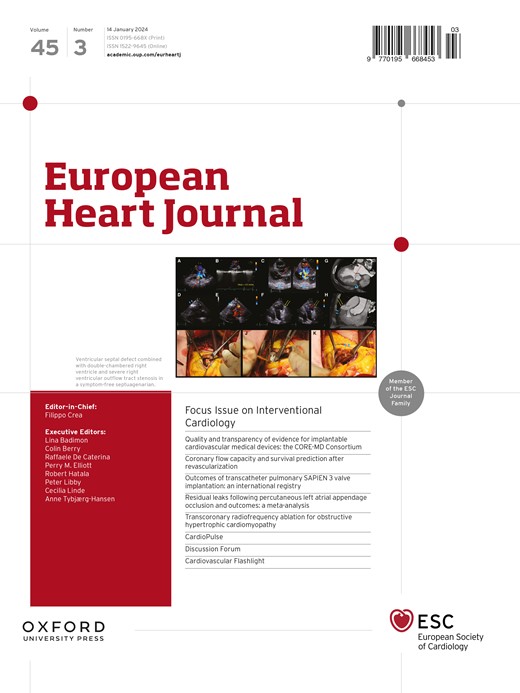秋水仙碱二级预防血管事件的长期试验:荟萃分析
IF 37.6
1区 医学
Q1 CARDIAC & CARDIOVASCULAR SYSTEMS
引用次数: 0
摘要
背景和目的秋水仙碱作为一种安全、廉价的抗炎药物,在冠状动脉疾病的二级预防中针对心血管事件的残余风险。最近发表的两项随机对照试验(rct)调查了秋水仙碱在卒中后和心肌梗死后(MI)人群中的作用,需要对秋水仙碱进行重新评估。系统回顾和荟萃分析综合了新的证据,以确定秋水仙碱对血管疾病二级预防的长期有效性和安全性。方法纳入随机对照试验,比较秋水仙碱组与安慰剂组临床表现血管疾病患者心血管事件发生率,随访≥12个月。主要疗效终点是主要心血管不良事件(MACE),包括心血管死亡率、心肌梗死、缺血性卒中和紧急冠状动脉血运重建术。使用DerSimonian和Laird随机效应模型计算合并效应估计。结果纳入6项随机对照试验,共纳入21 800例患者(秋水仙碱n = 10 871;安慰剂n = 10 929)。在12-34个月的随访中,与安慰剂相比,秋水仙碱降低了MACE的发生率[合并风险比为0.75,95%可信区间(CI)为0.56 - 0.93]。秋水仙碱患者心血管事件的减少是由于MIs、缺血性卒中和紧急冠状动脉血管重建术的减少(P <;0.05)。在安全结果方面没有发现差异(P >;0.05),包括非心血管死亡(风险比1.08,95% CI 0.76 - 1.54)。这项最新的荟萃分析显示,与安慰剂相比,秋水仙碱可显著降低MACE、心肌梗死、缺血性卒中和复发性冠状动脉血运重建。因此,结果支持使用秋水仙碱减少复发性心血管事件。本文章由计算机程序翻译,如有差异,请以英文原文为准。
Long-term trials of colchicine for secondary prevention of vascular events: a meta-analysis
Background and Aims Colchicine has emerged as a safe and inexpensive anti-inflammatory medication to target the residual risk of cardiovascular events in the secondary prevention of coronary artery disease. Two recently published randomized controlled trials (RCTs) investigating colchicine in the post-stroke and post-myocardial infarction (MI) populations warrant a re-evaluation of colchicine. New evidence was synthesized in a systematic review and meta-analysis to determine the long-term efficacy and safety of colchicine for the secondary prevention of vascular disease. Methods Randomized controlled trials comparing the incidence of cardiovascular events between patients with clinically manifest vascular disease randomized to colchicine vs. placebo and ≥12-month follow-up were included. The primary efficacy endpoint is major adverse cardiovascular events (MACE) and includes cardiovascular mortality, MI, ischaemic stroke, and urgent coronary revascularization. The DerSimonian and Laird random effects model was used to calculate pooled effect estimates. Results Six RCTs, with a pooled sample size of 21 800 patients, were included (colchicine n = 10 871; placebo n = 10 929). Over a follow-up of 12–34 months, colchicine reduced the incidence of MACE compared with placebo [pooled hazard ratio .75, 95% confidence interval (CI) .56–.93]. The reduction in cardiovascular events among colchicine patients was driven by reductions in MIs, ischaemic strokes, and urgent coronary revascularizations (P < .05 for all). No differences were detected for safety outcomes (P > .05 for all), including non-cardiovascular deaths (risk ratio 1.08, 95% CI .76–1.54). Conclusions This updated meta-analysis of RCTs demonstrated a substantial reduction in MACE, MI, ischaemic stroke, and recurrent coronary revascularization with colchicine compared with placebo. Therefore, the results support the use of colchicine to reduce recurrent cardiovascular events.
求助全文
通过发布文献求助,成功后即可免费获取论文全文。
去求助
来源期刊

European Heart Journal
医学-心血管系统
CiteScore
39.30
自引率
6.90%
发文量
3942
审稿时长
1 months
期刊介绍:
The European Heart Journal is a renowned international journal that focuses on cardiovascular medicine. It is published weekly and is the official journal of the European Society of Cardiology. This peer-reviewed journal is committed to publishing high-quality clinical and scientific material pertaining to all aspects of cardiovascular medicine. It covers a diverse range of topics including research findings, technical evaluations, and reviews. Moreover, the journal serves as a platform for the exchange of information and discussions on various aspects of cardiovascular medicine, including educational matters.
In addition to original papers on cardiovascular medicine and surgery, the European Heart Journal also presents reviews, clinical perspectives, ESC Guidelines, and editorial articles that highlight recent advancements in cardiology. Additionally, the journal actively encourages readers to share their thoughts and opinions through correspondence.
 求助内容:
求助内容: 应助结果提醒方式:
应助结果提醒方式:


